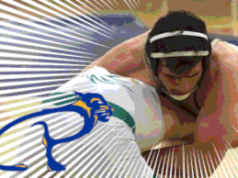Note: For the rest of this article, anywhere I use the word “coach,” you can probably interpret it just as accurately as “coaching staff.”
College wrestling coaches have a multitude of roles to play during any given season, or even any given day or week. The best coaches are able to deftly move between roles and be exactly what the team needs at any given moment. There are, however, many different ways to accomplish this and run a team. No two coaches are alike, and you will find significant contrasts of style between the coaches of any two teams. However, the following five areas are important for any coach who has winning as his goal. There is more than one way to pull each of them off, but ignoring one will surely have negative consequences. I want to make sure I don’t say “this way is best,” because every coach is different and success can come from a lot of different directions. Click to read more.
Recruiting
The lifeblood of any team is the wrestlers that a coach brings in. While expert training and a focused conditioning program can result in significant improvements, starting with better raw materials makes for a better finished product. Each school and team, however, has to go about recruiting in a different way. If you coach at a state school with moderate admissions standards, your focus will be on wrestlers in your own state. As it gets harder and harder to get into a school, coaches have to cast a wider and wider net to find competitive athletes who can also be admitted. Since this is Division III, there isn’t a scholarship to entice athletes to the team, so coaches have to sell the recruit on the quality of the school, the quality of the wrestling, and how a wrestler will improve while on the team. Recruiting is one of the hardest parts of coaching, no matter what the school is like. It’s difficult at prestigious schools because, even if a lot of people want to go there, the admission standards limits the potential pool of athletes. At other schools, making a specific school stand out when there may be other similar schools nearby. Not very many schools are like Olivet, the only DIII team in Michigan, but even there, Coach Hibbs has to keep Michigan wrestlers in Michigan and convince them to wrestle in Division III. Basically, recruiting is both necessary and difficult, no matter what school it is.
Wrestling Training
When most people talk about coaching, this is what they are talking about. Planning practice, executing it, determining which technique to teach, and teaching it effectively are all major aspects of wrestling training. Some coaches like to show all the technique and run practice themselves. Others let assistant coaches do most of it. Still others use a combination of both. Again, you’ll find successful coaches from each school of thought, but regardless of the method, this is where coaches develop the athletes they recruited into successful college wrestlers. Though most of the basics of wrestling have stayed the same over the years, the sport constantly evolves as techniques fall in and out of fashion, new techniques are developed, and the sport changes directions. These days, it seems that defense is ahead of offense thanks to increased scrambling ability by today’s wrestlers, so coaches have to be able to coach this style and coach against it. In a few years, offense may again pass defense and result in more high scoring matches. Keeping abreast of these changes and tailoring coaching to the strengths and weakness of the individual wrestlers is how coaches find success in this area.
Strength and Conditioning
Athletic ability can carry certain athletes a long way, but improving strength and conditioning can pay big dividends in the physical world of college wrestling. Finesse and quickness are excellent attributes, but sometimes, wrestlers need to be able to have stretches where they are “winning without scoring,” in the words of my former coach Neil Turner. Strength and conditioning can lead to greater quickness and allow wrestlers to execute their technique later in the match and against better opponents. Great wrestlers train more than just at practice, and coaches who are able to develop effective strength and conditioning program can effect team-wide improvement. If nothing else, strength training is a must just to keep up with the competition. Obviously some wrestlers are stronger than others, but this is a way to bring the playing field closer to level. If a coach isn’t an expert in this area, he finds someone who is and can implement an effective program.
Leadership and Motivation
These are areas where one will find vastly different strategies and methods. There is nothing wrong with this, as every individual coach, whether head or assistant, will have different ways of eliciting the best possible performance out of his wrestlers. It seems to come down mostly to knowing each wrestler and knowing when to encourage, when to berate, and when to instruct. What is coaching if not preparing wrestlers for competition and then putting them in a state of mind to achieve their potential and the advantage of long hours of training. The best coaches are able to convince their athletes they will win. Each wrestler brings a certain amount of this attitude naturally, but nurturing it into a refusal to lose can get wrestlers to both win when they’re supposed to and when they’re not. Dan Gable perfected the idea of deserving to win and refusing to lose, and it was a big part of his success at Iowa. Everybody wants to win, but not everybody hates to lose, and if coaches can move athletes from the former category to the latter, more success will follow.
Scheduling
Finally,wrestlers must have somewhere to go compete. Ideally, coaches will want to set up a schedule so the wrestlers will peak at the right time (i.e., the national qualifier and NCAA tournament). Whether coaches want to get as many matches in as possible or perhaps back off at certain times, successful coaches seem to set their schedule so that the degree of difficulty matches the skill level of the team. Of course, there will be certain times when you want to test wrestlers in the fire of tough competition, but few coaches keep the gas pedal on the floor in terms of schedule difficulty for the whole season from November to March. Competition is why athletes train so hard, and a good schedule will reward them for all the unseen hours spent running, lifting, and wrestling by putting them in situations where they can demonstrate their mastery of the sport.
Is there one best way to accomplish all of this? Clearly not, but I believe aspiring coaches can assess their own strengths and weaknesses, surround themselves with capable assistants, and pick and choose the methods of successful coaches to develop a strategy that works best for them and their wrestlers. The whole sport benefits when more coaches are dedicated to building excellent programs and consistently turn out great wrestlers.







I agree with this. I think the toughest part for DIII schools is the recruiting, especially at a place like I was at with no history.
Comments are closed.